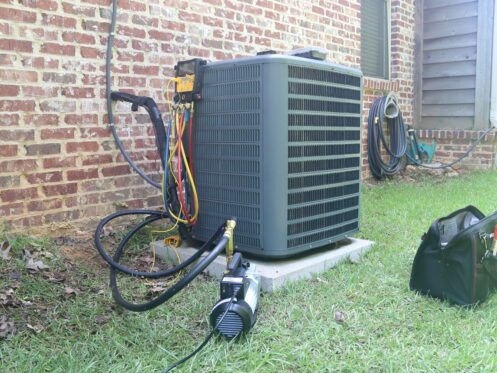With temperatures frequently reaching 90 degrees Fahrenheit and higher, summers in Douglas, GA can put your AC to the test. Pooling water near the air handler is a common sign of stress. From dirty air filters to blocked condensate drains and condensers, AC leaks have many possible causes. Knowing how to deal with an AC leak will keep this issue from spiraling out of control.
Turn Your Air Conditioner Off
Air conditioner leaks and the conditions that cause them often lead to functional problems, such as short cycling, overheating, or outright shutdown. Turn your air conditioner off at the first sign of leakage. Doing so gives an overheated AC unit time to cool down and allows a frozen evaporator coil to shed its ice. It also gives you the chance to find and fix minor faults.
Address the Mess
Clean up all standing water beneath or around your air handler. Pooling water near active appliances is always an electrical hazard. You can use your mop, old towels, or a wet/dry vacuum to get the job done.
Check Your HVAC Air Filter
HVAC equipment manufacturers recommend inspecting and replacing air filters every one to three months. When air filters reach the end of their lifespans, they often have heavy buildups of lint, dirt, and other particulate matter.
When your air conditioner is on, it draws warm indoor air through its filter and over its evaporator coil. Cold refrigerant inside the evaporator coil lowers the temperature of this air and extracts its humidity. Dirty air filters impede this process by inhibiting airflow.
When air conditioners can’t absorb and transfer heat and humidity at a sufficient rate, the cold refrigerant in their evaporator coils causes them to ice over. As this ice melts, it creates pooling water around air handlers. If your air conditioner has a dirty filter, replacing this component should solve the problem.
Inspect Your Drain Pan
Air conditioners release extracted humidity as condensation. This condensation moves through their condensate lines and exits via the drains. Unfortunately, the warm, moist conditions of condensate drains provide the ideal environment for mold, mildew, algae, and other growths.
When homeowners skip annual AC maintenance, heavy buildups of algae and bacteria in AC condensate drains often lead to backups and overflows during operation. If your air conditioner is leaking due to a dirty condensate drain and overflowing drain pan, schedule a tune-up right away. Our technicians will give your cooling system model-specific service to clean, disinfect, and deodorize this important component.
Ensure Adequate Clearance at the Outdoor Condenser
After shedding humidity via their condensate drains, air conditioners release collected heat at their outdoor condenser units. It’s important to maintain at least 24 inches of clearance on all sides of your condenser. Much like dirty air filters, overgrown shrubs, windblown debris, and other obstructions at the condenser unit can inhibit airflow and cause problems like icing, overheating, and leaks.
Remove all debris from the perimeter of your AC unit. After letting your air conditioner rest for 20 to 30 minutes, turn it back on for a test run.
Look for Closed or Blocked Air Vents
Verify that all HVAC air vents throughout your home are open or partially open. Closed air vents place air conditioners under stress by increasing static pressure within air ducts. There may be people in your household who close the vents in their immediate areas to direct conditioned air away. Vent closures can cause the evaporator coil to ice over and will eventually lead to pooling water on your floor.
When to Schedule Service
If your air conditioner is leaking, turn it off, clean up all standing water, and check for airflow obstructions. However, if your system continues to leak after you’ve created adequate clearance around its condenser unit, opened closed vents, and replaced the air filter, it’s time to schedule service. Your air conditioner might have a refrigerant leak rather than frozen coils, a blocked condensate drain, or another stress or maintenance-related issue.
Continuing to run an air conditioner with an active refrigerant leak can shorten the lifespan of its compressor. The AC compressor alternately pressurizes and depressurizes refrigerant to pump it throughout the cooling system. With increasingly less refrigerant to pressurize, your compressor could fail or collapse.
We Can Help
Since 1959, we’ve proudly served homeowners in Douglas and the surrounding cities with expert AC services, including maintenance, installation, and repair services. As members of the Conditioned Air Association of Georgia (CAAG) and the Coffee County Chamber of Commerce, we proudly stand behind our work with solid satisfaction guarantees. If you have a leaky air conditioner, contact Chancey Heating & Cooling today for AC repair!

